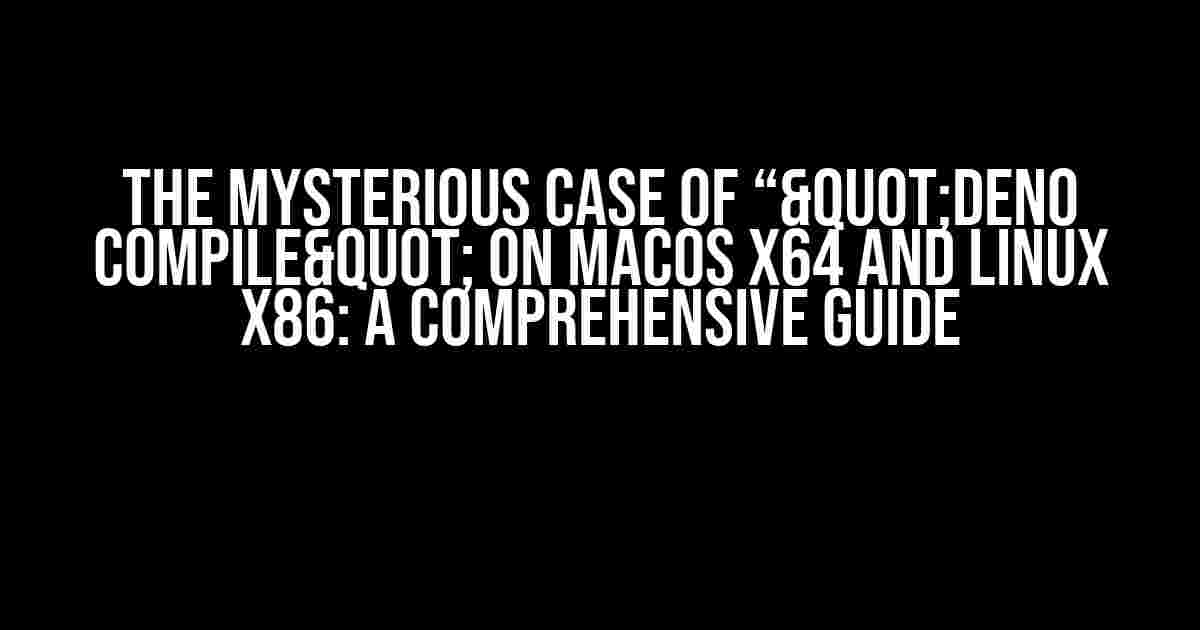Are you tired of dealing with the frustrating issue of “"deno compile" working seamlessly on macOS X64, only to fail miserably with a compilation error on Linux X86? You’re not alone! Many developers have fallen victim to this infuriating problem, but fear not, dear reader, for we’re about to embark on a journey to unravel the mystery behind this pesky issue.
What is Deno Compile, and Why Does it Matter?
Deno, a relatively new kid on the block, is a runtime for JavaScript and TypeScript that aims to provide a secure and efficient way to execute code. The “deno compile” command is a crucial part of the Deno ecosystem, allowing developers to compile their code into a platform-specific executable. But why does it matter, you ask? Well, a successful compile process means your code is ready to be deployed, and that’s a crucial step in getting your application up and running!
The Problem:Compilation Error on Linux X86
So, what exactly goes wrong when we try to compile our code on Linux X86 using Deno? The error message might look something like this:
deno compile --target x86_64-unknown-linux-gnu my_program.ts error: Unable to compile my_program.ts: error: linking with cc failed: exit status: 1
Frustrating, right? But don’t worry, we’ll get to the bottom of this!
Understanding the Root Cause:Architecture and Dependencies
To resolve this issue, we need to understand the underlying architecture and dependencies involved. Let’s break it down:
- macOS X64:** The compilation process on macOS X64 works smoothly because the Deno runtime is built with macOS-specific dependencies, which are compatible with the X64 architecture.
- Linux X86:** However, when we try to compile on Linux X86, the Deno runtime struggles to find the necessary dependencies, leading to the compilation error.
But what exactly are these dependencies, you ask? It all comes down to the musl libc library, which is a critical component in the Deno runtime. Musl libc is a lightweight, open-source implementation of the standard C library, and it’s the default libc on most Linux systems.
The Solution:Using the Correct Musl Libc Version
Now that we know the root cause, let’s dive into the solution! To fix the compilation error on Linux X86, we need to ensure that we’re using the correct version of musl libc that’s compatible with the Deno runtime.
Here’s what you need to do:
- Install the musl libc library on your Linux system:
sudo apt-get update sudo apt-get install musl-dev
- Verify that you have the correct version of musl libc installed:
musl-gcc --version
Make sure the version is 1.1.24 or higher. If you’re running an older version, update musl-gcc using:
sudo apt-get install musl-gcc
- Re-run the “deno compile” command, specifying the correct target architecture:
deno compile --target x86_64-unknown-linux-musl my_program.ts
Voilà! Your code should now compile successfully on Linux X86.
Additional Tips and Tricks
To avoid future headaches, keep the following tips in mind:
- Keep your musl libc version up-to-date:** Regularly update musl-gcc to ensure you have the latest version.
- Specify the correct target architecture:** Always specify the correct target architecture when running the “deno compile” command.
- Verify your dependencies:** Double-check that you have all the necessary dependencies installed on your system.
Conclusion
In conclusion, the “"deno compile" issue on Linux X86 can be resolved by understanding the underlying architecture and dependencies, and by using the correct version of musl libc. By following the steps outlined in this article, you should be able to compile your code successfully on Linux X86.
Happy coding, and don’t let compilation errors get the best of you!
| Platform | Architecture | Target Flag | Musl libc Version |
|---|---|---|---|
| macOS | X64 | –target x86_64-apple-darwin | N/A |
| Linux | X86 | –target x86_64-unknown-linux-musl | 1.1.24 or higher |
Remember, the correct target flag and musl libc version are crucial for a successful compilation process. Don’t forget to bookmark this article for future reference!
Frequently Asked Question
Got stuck with “deno compile” on Linux x86? Don’t worry, we’ve got you covered!
Q: Why does “deno compile” work on macOS X64 but fails on Linux X86?
A: This might be due to differences in the operating system’s architecture and the compiler’s configuration. macOS X64 and Linux X86 have distinct ABIs (Application Binary Interfaces), which can lead to incompatibilities. Additionally, the compiler’s flags and settings might not be identical on both platforms, causing the compilation error.
Q: Are there any known issues with Deno’s compilation on Linux x86?
A: Yes, there have been reports of issues with Deno’s compilation on Linux x86, particularly related to the Musl libc implementation. The Deno team is actively working on resolving these issues, and it’s recommended to check the official issues tracker for updates.
Q: How can I troubleshoot the compilation error on Linux x86?
A: To troubleshoot the issue, try enabling verbose mode by running “deno compile –verbose” to get more detailed error messages. You can also try specifying the target architecture explicitly using the “–target” flag, for example, “deno compile –target=x86_64-unknown-linux-gnu”. If the issue persists, provide the error logs to the Deno community or report an issue on GitHub.
Q: Are there any workarounds for the compilation error on Linux x86?
A: Yes, as a temporary workaround, you can try using a Linux x64 machine or a Docker container with a compatible architecture. Alternatively, you can attempt to compile your code using a different compiler or a cloud-based compilation service. However, be aware that these workarounds might not be ideal for production environments.
Q: Will Deno support Linux x86 compilation in the future?
A: Yes, the Deno team has expressed commitment to supporting Linux x86 compilation. As the project evolves, you can expect improvements and fixes to the compilation process. Keep an eye on the official roadmap and issue tracker for updates on this front.

